牛津深圳版英语七年级上册 Unit 4 Seasons 课时3 语法课件(共20张PPT)
文档属性
| 名称 | 牛津深圳版英语七年级上册 Unit 4 Seasons 课时3 语法课件(共20张PPT) |  | |
| 格式 | pptx | ||
| 文件大小 | 2.2MB | ||
| 资源类型 | 教案 | ||
| 版本资源 | 牛津深圳版 | ||
| 科目 | 英语 | ||
| 更新时间 | 2023-07-26 08:30:36 | ||
图片预览

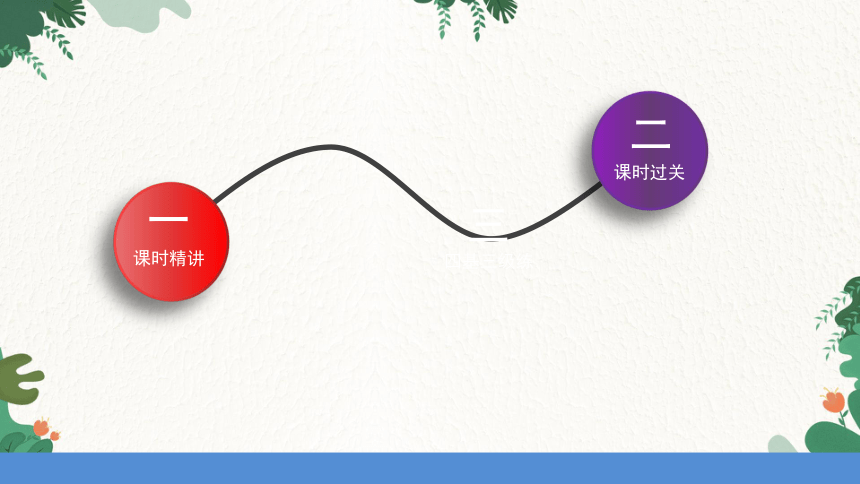
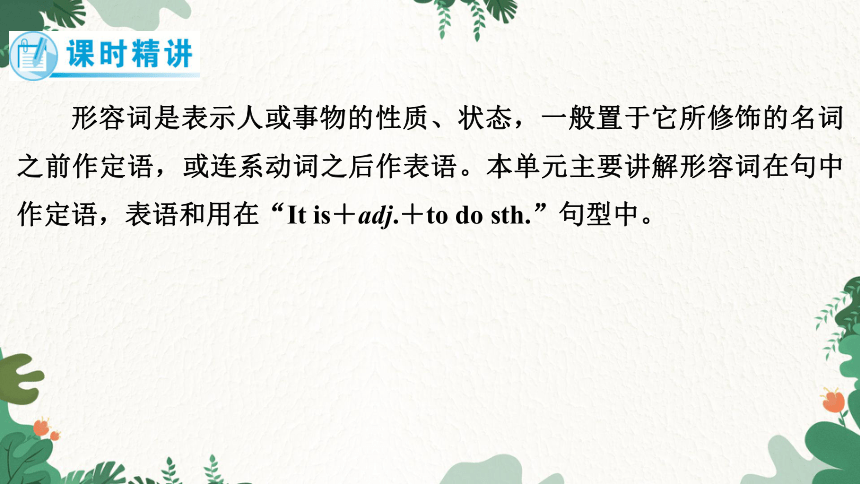
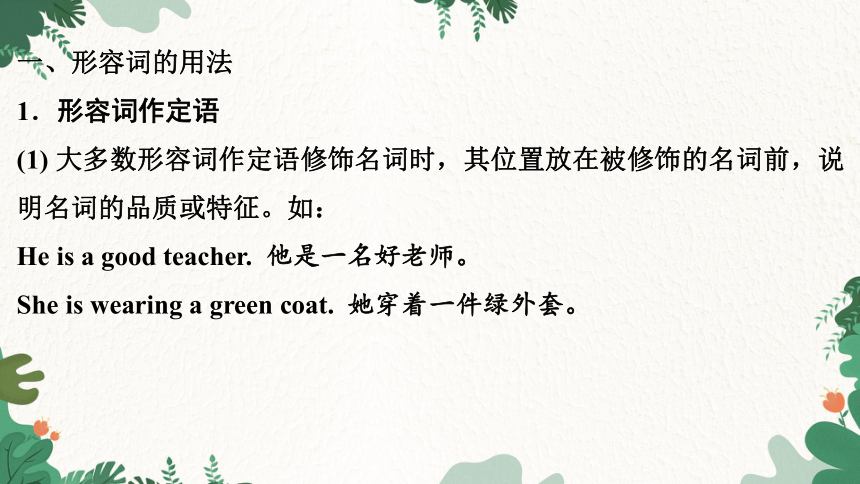
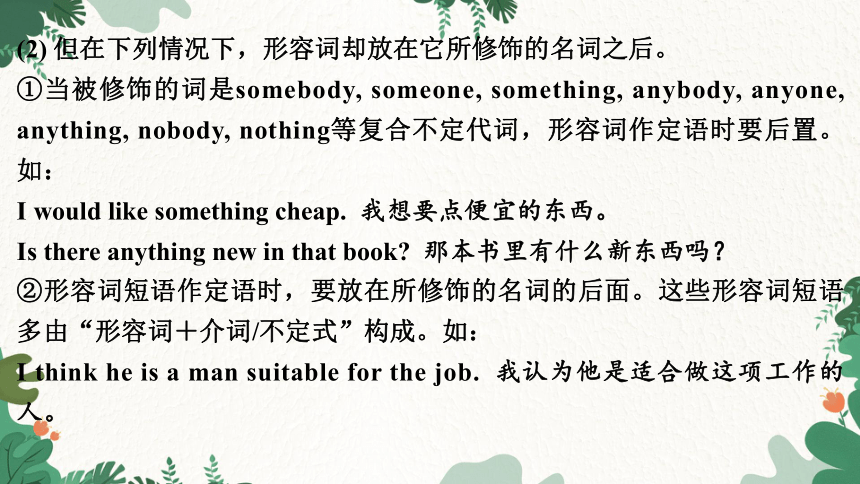
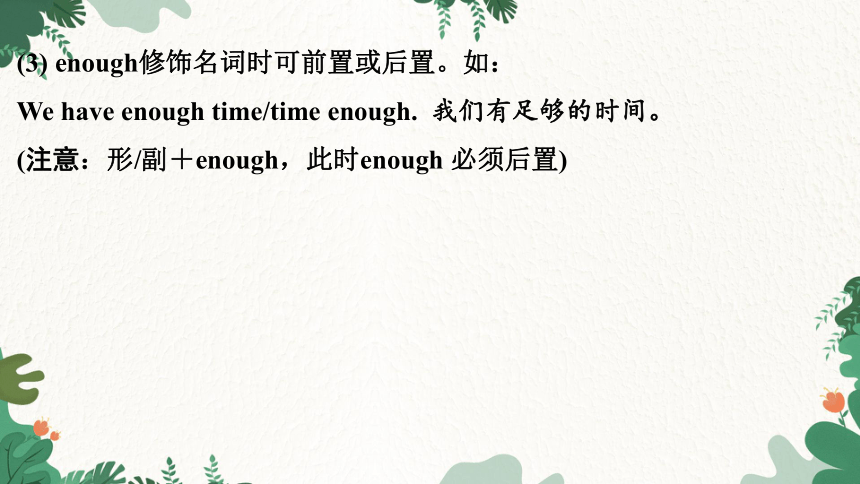
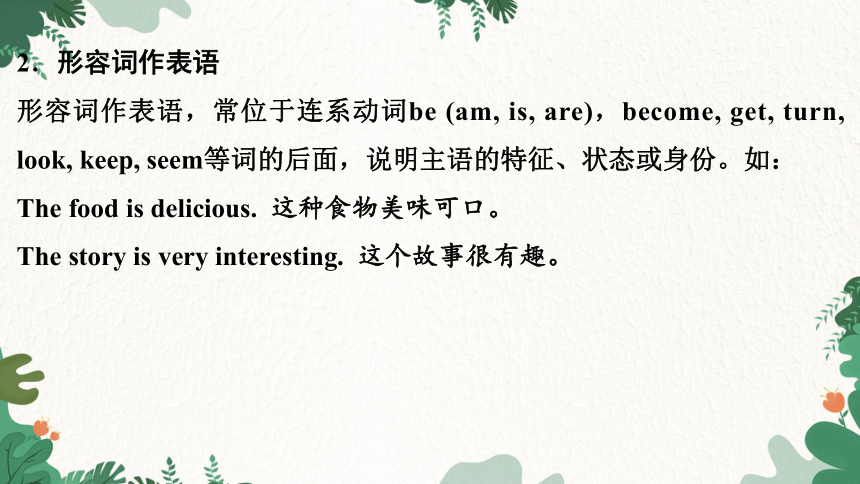
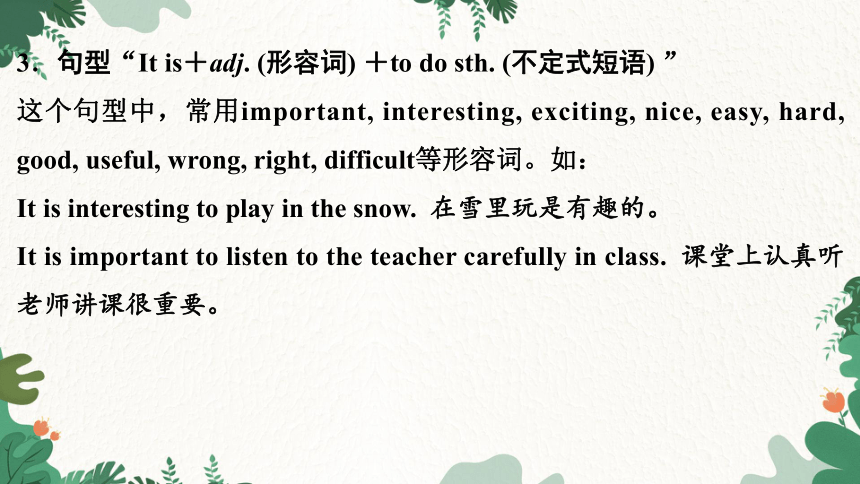

文档简介
(共20张PPT)
Unit 4 Seasons
课时3
语法
一
课时精讲
三
四基三级练
二
课时过关
形容词是表示人或事物的性质、状态,一般置于它所修饰的名词之前作定语,或连系动词之后作表语。本单元主要讲解形容词在句中作定语,表语和用在“It is+adj.+to do sth.”句型中。
一、形容词的用法
1.形容词作定语
(1) 大多数形容词作定语修饰名词时,其位置放在被修饰的名词前,说明名词的品质或特征。如:
He is a good teacher. 他是一名好老师。
She is wearing a green coat. 她穿着一件绿外套。
(2) 但在下列情况下,形容词却放在它所修饰的名词之后。
①当被修饰的词是somebody, someone, something, anybody, anyone, anything, nobody, nothing等复合不定代词,形容词作定语时要后置。如:
I would like something cheap. 我想要点便宜的东西。
Is there anything new in that book 那本书里有什么新东西吗?
②形容词短语作定语时,要放在所修饰的名词的后面。这些形容词短语多由“形容词+介词/不定式”构成。如:
I think he is a man suitable for the job. 我认为他是适合做这项工作的人。
(3) enough修饰名词时可前置或后置。如:
We have enough time/time enough. 我们有足够的时间。
(注意:形/副+enough,此时enough 必须后置)
2.形容词作表语
形容词作表语,常位于连系动词be (am, is, are),become, get, turn, look, keep, seem等词的后面,说明主语的特征、状态或身份。如:
The food is delicious. 这种食物美味可口。
The story is very interesting. 这个故事很有趣。
3.句型“It is+adj. (形容词) +to do sth. (不定式短语) ”
这个句型中,常用important, interesting, exciting, nice, easy, hard, good, useful, wrong, right, difficult等形容词。如:
It is interesting to play in the snow. 在雪里玩是有趣的。
It is important to listen to the teacher carefully in class. 课堂上认真听老师讲课很重要。
(1) 此句型中,如果表语是kind, nice, right, wrong, clever, polite等描述性格、品质的形容词,则应在不定式前加of sb. 即“It is+adj.+of sb.+to do sth.”某人做某事是…… 如:
It is very kind of you to help me. 你能帮我你真是太好了。
It's clever of you to do so. 你这样做真聪明。
(2) 如果形容词表示“对某人而言”,描述的是事情的性质,可在动词不定式前加一个for sb. 即“It is+adj.+for sb.+to do sth.”对某人来说做某事是…… 如:
It's difficult for us to finish the work. 对我们来说,完成这项工作很困难。
It's hard for me to answer your question. 对我来说,要回答你的问题很难。
二、名词变形容词的方法
1.在名词后面加-y可以变成形容词 (尤其是一些与天气有关的名词)。
rain→rainy多雨的, cloud→cloudy多云的, wind→windy有风的, snow→snowy多雪的,
health→healthy健康的, luck→lucky幸运的
注意:如果名词以重读闭音节结尾,且词尾只有一个辅音字母,这时应双写词尾的辅音字母再加-y。如:sun→sunny晴朗的, fog→foggy有雾的, fun→funny有趣的;
如果以不发音的字母e结尾的名词变为形容词时,应去掉e再加-y。如:
noise→noisy吵闹的, ice→icy冰冷的
2.一些抽象名词在词尾加-ful可以变为形容词。如:
care→careful小心的, thank→thankful感谢的, help→helpful有帮助的
3.一些表示国家的名词可以在词尾加-ese, -ish或-n构成表示国籍、语言的形容词。如:
China→Chinese, Japan→Japanese, England→English, America→American
4.在名词后加-ous变为形容词。如:danger→dangerous
5.在名词后加-ly变为形容词。如:friend→friendly, love→lovely (以-ly结尾的还有lonely, lively)
6.在名词后加-less变成含有否定意义的形容词。如:care→careless粗心的, use→useless无用的
7.一些以-ence结尾的名词,把-ence改为ent变成形容词。如:difference→different, silence→silent安静的
一、写出下列单词的形容词。
1.health _________ 2.rain _______
3.snow ________ 4.sun _______
5.interest ______________________ 6.noise _______
7.importance ___________ 8.friend __________
9.danger ___________ 10.use __________________
healthy
rainy
snowy
sunny
interesting/interested
noisy
important
friendly
dangerous
useful/useless
二、用所给词的适当形式填空。
1.The film isn't ___________ (suit) for children under 16.
2.They were all ____________ when they saw the_____________ ending of the film. (surprise)
3.He told the police __________ (brief) what he had heard last night.
4.Vegetables are much ____________ (healthy) for us than fat.
5.Mr. Smith usually gives us some _________ (advice) on learning English.
suitable
surprised
surprising
briefly
healthier
advice
6.The neighbours were ________ with the ________ noise around. (bore)
7.I'm sorry that I couldn't come to have my hair _______ (do) today.
8.Our English teacher always makes his class ______________, so we are all _____________ in English.(interest)
9.The earthquake ___________ (destroy) many houses in Yaoan, Yunnan Province on July 9, 2009.
10.That's __________. We are ________ that he agreed so quickly. (amaze)
bored
boring
done
interesting
interested
destroyed
amazing
amazed
三、用“It+is+adj.+to do sth.”的形式翻译下列句子。
1.在空闲时间跟朋友们一起玩游戏是有趣的。 (It's interesting to…)
_____________________________________________________________
2.每天吃新鲜的水果对我们来说是很重要的。 (It's important for us to…)
________________________________________________________
It's interesting to play games with friends in the free time.
It's important for us to eat fresh fruit every day.
3.爬这座山很危险。 (It's dangerous to…)
___________________________________________
4.你帮助我学英语真是太友好了。 (It's friendly of you to…)
____________________________________________________
It's dangerous to climb this mountain.
It's friendly of you to help me learn English.
谢谢大家!
Unit 4 Seasons
课时3
语法
一
课时精讲
三
四基三级练
二
课时过关
形容词是表示人或事物的性质、状态,一般置于它所修饰的名词之前作定语,或连系动词之后作表语。本单元主要讲解形容词在句中作定语,表语和用在“It is+adj.+to do sth.”句型中。
一、形容词的用法
1.形容词作定语
(1) 大多数形容词作定语修饰名词时,其位置放在被修饰的名词前,说明名词的品质或特征。如:
He is a good teacher. 他是一名好老师。
She is wearing a green coat. 她穿着一件绿外套。
(2) 但在下列情况下,形容词却放在它所修饰的名词之后。
①当被修饰的词是somebody, someone, something, anybody, anyone, anything, nobody, nothing等复合不定代词,形容词作定语时要后置。如:
I would like something cheap. 我想要点便宜的东西。
Is there anything new in that book 那本书里有什么新东西吗?
②形容词短语作定语时,要放在所修饰的名词的后面。这些形容词短语多由“形容词+介词/不定式”构成。如:
I think he is a man suitable for the job. 我认为他是适合做这项工作的人。
(3) enough修饰名词时可前置或后置。如:
We have enough time/time enough. 我们有足够的时间。
(注意:形/副+enough,此时enough 必须后置)
2.形容词作表语
形容词作表语,常位于连系动词be (am, is, are),become, get, turn, look, keep, seem等词的后面,说明主语的特征、状态或身份。如:
The food is delicious. 这种食物美味可口。
The story is very interesting. 这个故事很有趣。
3.句型“It is+adj. (形容词) +to do sth. (不定式短语) ”
这个句型中,常用important, interesting, exciting, nice, easy, hard, good, useful, wrong, right, difficult等形容词。如:
It is interesting to play in the snow. 在雪里玩是有趣的。
It is important to listen to the teacher carefully in class. 课堂上认真听老师讲课很重要。
(1) 此句型中,如果表语是kind, nice, right, wrong, clever, polite等描述性格、品质的形容词,则应在不定式前加of sb. 即“It is+adj.+of sb.+to do sth.”某人做某事是…… 如:
It is very kind of you to help me. 你能帮我你真是太好了。
It's clever of you to do so. 你这样做真聪明。
(2) 如果形容词表示“对某人而言”,描述的是事情的性质,可在动词不定式前加一个for sb. 即“It is+adj.+for sb.+to do sth.”对某人来说做某事是…… 如:
It's difficult for us to finish the work. 对我们来说,完成这项工作很困难。
It's hard for me to answer your question. 对我来说,要回答你的问题很难。
二、名词变形容词的方法
1.在名词后面加-y可以变成形容词 (尤其是一些与天气有关的名词)。
rain→rainy多雨的, cloud→cloudy多云的, wind→windy有风的, snow→snowy多雪的,
health→healthy健康的, luck→lucky幸运的
注意:如果名词以重读闭音节结尾,且词尾只有一个辅音字母,这时应双写词尾的辅音字母再加-y。如:sun→sunny晴朗的, fog→foggy有雾的, fun→funny有趣的;
如果以不发音的字母e结尾的名词变为形容词时,应去掉e再加-y。如:
noise→noisy吵闹的, ice→icy冰冷的
2.一些抽象名词在词尾加-ful可以变为形容词。如:
care→careful小心的, thank→thankful感谢的, help→helpful有帮助的
3.一些表示国家的名词可以在词尾加-ese, -ish或-n构成表示国籍、语言的形容词。如:
China→Chinese, Japan→Japanese, England→English, America→American
4.在名词后加-ous变为形容词。如:danger→dangerous
5.在名词后加-ly变为形容词。如:friend→friendly, love→lovely (以-ly结尾的还有lonely, lively)
6.在名词后加-less变成含有否定意义的形容词。如:care→careless粗心的, use→useless无用的
7.一些以-ence结尾的名词,把-ence改为ent变成形容词。如:difference→different, silence→silent安静的
一、写出下列单词的形容词。
1.health _________ 2.rain _______
3.snow ________ 4.sun _______
5.interest ______________________ 6.noise _______
7.importance ___________ 8.friend __________
9.danger ___________ 10.use __________________
healthy
rainy
snowy
sunny
interesting/interested
noisy
important
friendly
dangerous
useful/useless
二、用所给词的适当形式填空。
1.The film isn't ___________ (suit) for children under 16.
2.They were all ____________ when they saw the_____________ ending of the film. (surprise)
3.He told the police __________ (brief) what he had heard last night.
4.Vegetables are much ____________ (healthy) for us than fat.
5.Mr. Smith usually gives us some _________ (advice) on learning English.
suitable
surprised
surprising
briefly
healthier
advice
6.The neighbours were ________ with the ________ noise around. (bore)
7.I'm sorry that I couldn't come to have my hair _______ (do) today.
8.Our English teacher always makes his class ______________, so we are all _____________ in English.(interest)
9.The earthquake ___________ (destroy) many houses in Yaoan, Yunnan Province on July 9, 2009.
10.That's __________. We are ________ that he agreed so quickly. (amaze)
bored
boring
done
interesting
interested
destroyed
amazing
amazed
三、用“It+is+adj.+to do sth.”的形式翻译下列句子。
1.在空闲时间跟朋友们一起玩游戏是有趣的。 (It's interesting to…)
_____________________________________________________________
2.每天吃新鲜的水果对我们来说是很重要的。 (It's important for us to…)
________________________________________________________
It's interesting to play games with friends in the free time.
It's important for us to eat fresh fruit every day.
3.爬这座山很危险。 (It's dangerous to…)
___________________________________________
4.你帮助我学英语真是太友好了。 (It's friendly of you to…)
____________________________________________________
It's dangerous to climb this mountain.
It's friendly of you to help me learn English.
谢谢大家!
